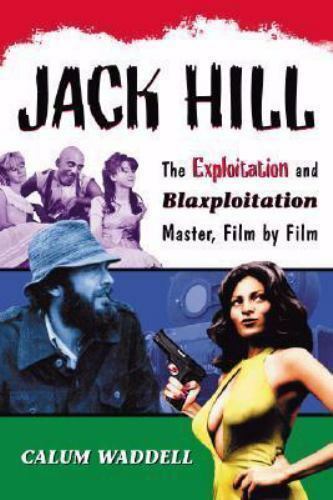By CALUM WADDELL (McFarland & Company, Inc; 2009)
The first and thus far only book about Jack Hill (JACK HILL: THE EXPLOITATION AND BLAXPLOITATION MASTER, FILM BY FILM), arguably the greatest exploitation movie director of the grindhouse era. Hill’s films, made largely under the auspices of Roger Corman, included such poverty row masterworks as SPIDER BABY, THE BIG DOLL HOUSE, COFFY and SWITCHBLADE SISTERS, all of which were graced by intelligence, filmmaking savvy and an unrivalled ability to deliver the exploitation movie goods (only Jack Hill could have come up with the oft-quoted BIG DOLL HOUSE line “Get it up or I’ll cut it off!”). Why Hill never advanced beyond the exploitation sphere is something even he seems puzzled about, especially since so many of his Corman mentored colleagues—Francis Ford Coppola, Monte Hellman, Peter Bogdonovich and Jonathan Demme—succeeded in carving out mainstream filmmaking careers.
COFFY (Trailer)
SWITCHBLADE SISTERS (Trailer)
This book doesn’t answer that quarry, although author Calum Waddell definitely mulls it over at some length. Waddell also provides succinct analyses of all Hill’s films, including obscure efforts like TRACK OF THE VAMPIRE, I A GROUPIE and a better-forgotten trio of Mexico-lensed Boris Karloff programmers. The text is enhanced by an admirably thorough knowledge of exploitation cinema, and features copious interviews with Hill and several of his collaborators. Among the revelations contained in the interviews are the fact that Hill feels Roger Corman screwed him out of profits from several of his films, and that Francis Ford Coppola apparently based the final scenes of APOCALYPSE NOW on Hill’s student film THE HOST.
TRACK OF THE VAMPIRE AKA Blood Bath (Clip)
THE HOST
On the downside, Waddell has a tendency to overstate the sociopolitical subtexts of Hill’s films. Waddell insists upon viewing them all through an antiauthoritarian Marxist prism, even though in the interviews Hill constantly negates that idea, claiming his real motivation was simply to make entertaining features.
More irritating is the author’s constant hand-wringing over the perceived sexism and homophobia of Hill’s films. Waddell is particularly hung up on the stereotypical depiction of gay characters in THE BIG BIRD CAGE, and can’t seem to get past a morally ambiguous rape scene in SWITCHBLADE SISTERS. In truth such things were fairly common in grindhouse cinema, where political correctness had no place. The fact that Waddell obsesses over such matters suggests he wasn’t an ideal choice to write about the films of Jack Hill, but since I don’t see anyone else volunteering to do so this book gets a partial recommendation nonetheless.

